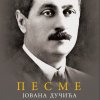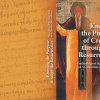The first bilingual edition translations of poems in French of this prince of Serbian poetry. These translations of poems Dučić meet two objectives: to publicize the work of the poet to Francophone readers and pay tribute to both the Serbian language Dučić and French language to which the great poet and Petar Bubreško were passionately attached. This book is dedicated to Leposava Bubreško (1923-2013) professor Bubreško’s wife who wanted so much this work to be published.
Publishers: Sebastian Press, Vidoslov, and Metokhia
216 pages, soft bound, published in 2015, price $15
Песме Јована Дучића
На француски језик превео проф. др Петар Д. Бубрешко
Ова књига је посвећена Лепосави Бубрешко (1923-2013), супрузи професора Петра Д. Бубрешка, која је толико желела да ово дело изађе на светлост
Саиздавачи: Видослов, Требиње и Metokhia, Paris
ПОЕЗИЈА
Мирна као мрамор, хладна као сена,
Ти си бледо тихо девојче што снева.
Пусти песма других нека буде жена,
Што по нечистим улицама пева.
Ја не мећем на те ђинђуве са траком,
Него жуте руже у те косе дуге:
Буди одвећ лепа да се свиђаш сваком,
Одвећ горда да би живела за друге.
Буди одвећ тужна са сопствених јада,
Да би ишла икад да тешиш ко страда,
А чедна, да водиш гомиле што нагле.
И стој равнодушна, док око твог тела,
Место китњастог и раскошног одела,
Лебди само прамен тајанствене магле.
POESIE
Calme comme le marbre, froide comme une ombre,
Tu es une jeune fille pâle, rêveuse ;
Que la poésie des autres soit une femme,
Qui chante dans les rues souillées.
Je ne te pare point de faux bijoux enrubannés,
Mais je mets des roses jaunes dans tes longs cheveux ;
Sois trop belle pour plaire à chacun,
Trop altière pour vivre pour les autres.
Sois trop affligée de tes propres chagrins
Pour vouloir consoler ceux qui souffrent,
Trop chaste pour mener les foules qui se hâtent.
Sois impassible, tandis qu’autour de ton corps,
Au lieu du costume barriolé, somptueux,
Flotte un halo solitaire de brume mystérieuse.





